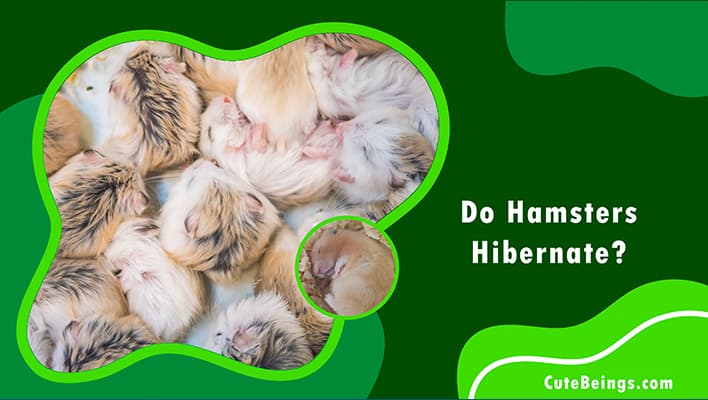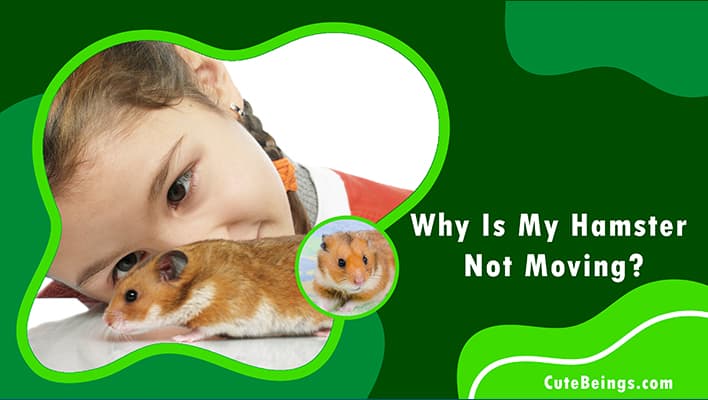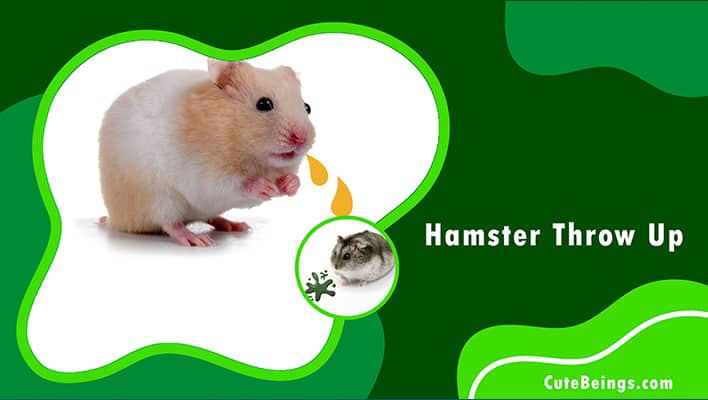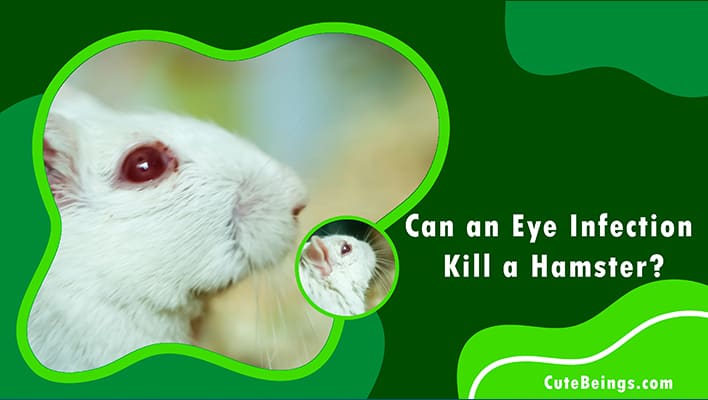If you spot your hamsters that seem to be barely moving or tend to look like they are dead, it would be very concerning for the hamster’s owners. However, this could be a behavioral pattern that your hamsters exhibit depending on the circumstances. This situation is described in this article using the term “hibernation,” which will provide you with more information on the subject.
So, here we will be addressing what factors could trigger this condition and whether there are any precautionary steps that you could take. Besides, we will also be covering the fact that it would vary depending on the hamster breed as well. So, let’s get into it right away.
Table of Contents
What is hibernation?
Hibernation is more like an inactive state where the hamster’s body temperature would decrease while its pulse rate and breathing rate would lower to conserve energy to cope with that. This is a condition that many animals go through. Once the hamsters are in hibernation, their metabolism functions at a lower rate. Due to all these symptoms, one might think that hamsters are hibernating.
What happens to the body during hibernation?
Once the hamsters go through hibernation, they will get cold and limp. Besides, they may also get stiff. You won’t be able to spot their respiration or heartbeats, etc. Furthermore, they will not bother eating or drinking.
Do hamsters hibernate?
Answering this question is somewhat complex. However, keep in mind that there could be some hamsters who would hibernate, while there could be some who don’t hibernate.
How long do hamsters hibernate?
Generally speaking, hamsters hibernate up to 2- 3 days.
Why do hamsters hibernate?
Hamsters may hibernate for several reasons. For example, changes in body temperatures and changes in the food supply would cause this condition. To further explain this, hamsters are permissive hibernators, which means they would hibernate irrespective of the season. If the conditions suit them, they can even hibernate for 2–3 days. To briefly explain, there would be another hibernation status called “obligatory hibernation.”
When do hamsters hibernate
Hamsters do not naturally hibernate in the wild, but some captive hamsters may slow down and become less active during the winter months. This is because they are sensitive to changes in temperature and light, and they may respond to the shorter days and colder weather by slowing down their metabolism and sleeping more.
What temperature do hamsters hibernate at?
If the temperature drops to 60 degrees Fahrenheit (15.5 degrees Celsius), chances are that hamsters will tend to sleep. further, they would tend to be less active than they usually are. On the other hand, temperatures below 50 or around 40 degrees Fahrenheit (10 degrees Celsius or 4 degrees Celsius) could cause hibernation in hamsters.
Do Hamsters Hibernate If It’s Warm?
No, hamsters would hibernate when it was too warm.
Do hamsters hibernate in summer?
Hamsters can hibernate in summer as well. Hamsters are permissive hibernators which means they would go
through hibernation in both winter and summer as well. They would hibernate to save energy during these extreme weather conditions.
Do hamsters hibernate in the winter?
Yes, hamsters hibernate in the winter, and it is completely natural for them to hibernate in the winter. Once the hamsters are hibernating in the winter, you could see them metabolizing at a low rate.
Hamster hibernating, dead, or Sleeping.
How to know if your hamster is hibernating
Some of the hibernation signs that you could use to determine that hamsters are going through hibernation are slowed breathing, coldness, limping, food binges, etc. To elaborate further on each sign, you could see a hamster who is going through hibernation tend to breathe somewhat slowly. Besides, you could spot minor twitching of his whiskers as well. These signs mean the hamsters are going through hibernation.
Another hibernation sign that you can use to determine if they are hibernating is cold. When you touch them, you will feel that they are cold to the touch. You can commonly spot this in the hamster’s locations where there is less fur. For example, you can feel this quite well in hamsters’ ears, paws, and noses as well. They would do this to conserve energy, especially in the winter.
Limp is another prominent hibernation sign, which you could use here. Once the hamsters are hibernating, you will feel like they are lifeless. Further, they would tend to become limp despite your attempts to manipulate them. Lastly, if you happen to see your hamsters tend to consume food in excess, it means they are approaching the hibernation stage. They would do that to survive on the excess fat once they hibernated.
Do all hamsters hibernate?
Not all hamsters would hibernate, as there would be some breeds that would hibernate while there would be others that wouldn’t. However, there may be some hamsters that would hibernate ineffectively.
Do hamsters breathe when they hibernate?
Yes, hamsters would breathe once they are hibernating but at a very slow pace.
Do hamsters hibernate with their eyes open?
Yes, hamsters hibernate with their eyes open. Besides, they can hibernate while their eyes are half closed or completely closed as well.
What To Do if Your Hamster Is Hibernating?
The first thing you need to make sure of is that you provide an adequate amount of food and water for them. Even though they hibernate, they tend to wake up and eat in between. Further, you need to ensure that you move them to a warmer location as well. That spot should be a place where there is a stable temperature. Once the temperature is warm, it would help them to regain their body heat and have a normal temperature within their bodies. If you are uncertain of what is happening with the hamsters, you can take them to a veterinarian and follow their guidelines as well.
Are hamsters stiff when they hibernate?
Hamsters don’t get stiff when they hibernate. If you see them stiff, it means they are dead.
How to Care for Your Hamster When They Are Hibernating?
Firstly, you need to ascertain whether your hamsters are hibernating or not. To do that, you should monitor the pulse rate of the hamsters. Thereafter, check their breathing rate and see whether they are cool when you try to touch them. To care for them, all you have to do is improve their conditions. For example, you can try to increase the body temperature by using your palm and giving them a small massage.
You can also wrap them in a warm cloth to heat them. I don’t recommend using external heating elements, as they would change the temperatures drastically. Next, you can consider increasing some bright light too. Don’t forget to supply them with adequate food and water, too. If these conditions last for too long, it would be worth paying a visit to the vet.
How to wake up a hibernating hamster
Waking up a hibernating hamster should be done gradually. Don’t ever try to wake them up suddenly. It will help them wake up naturally from hibernation if you do it gradually and gently. To do that, you need to first pick them up and massage them gently. Once you massage them, it will help them have proper blood circulation and make them warm. You can even consider keeping them in a chest pocket to heat them as well. Once you do these steps, they will wake up from hibernation.
Secondly, you can consider tuning up the thermostats or shifting their cage to a warmer room as well. Further, I suggest you keep a not-too-hot water bottle closer to their cage too. That will warm them up and wake them up from hibernation. Ensure that you don’t use direct heat to wake them up from hibernation faster. Instead, try to increase the temperature around their cage slowly.
Some people opt to use their blow-dryers to wake them up, and that would turn out to be more problematic for the hamsters. So avoid doing those with the hamsters unless you will have to treat the hamsters for more adverse effects. Lastly, if you are uncertain about how to handle this kind of situation, I recommend that you get the vet’s guidelines.
How to care for a hamster that woke up from hibernation.
The first thing you need to do is provide some water for them, as it is very likely that they are suffering from dehydration from their time in hibernation. So, give them some fresh water, which will give them some energy. If the hamsters seem to be very inactive, you can consider feeding them some water by using a syringe. When it comes to food, it would be best to give them some good food, such as cooked chicken. Cooked chicken would suit here the best; it would be easy for the hamsters to digest. Above all, it would be satisfying.
How can you prevent or stop a hamster from hibernating?
To do that, you first have to provide some clean and warm bedding for the hamsters. Next, make sure that they get an optimal temperature above 18 degrees Celsius (65 degrees Fahrenheit). However, temperatures should be below 24 degrees Celsius and 75 degrees Fahrenheit.
Furthermore, keep the hamsters and their cages stationary at all times. If nobody is checking on them while you are away, it would be best to get someone else to come to where the hamsters are. You could do that instead of shifting the hamster’s cage here and there.
Hypothermia can be confused with hibernation.
There is a high risk for hamster owners to get confused when identifying hypothermia with the hibernation of hamsters. If you happen to expose hamsters to extremely cold conditions all of a sudden, chances are that they may experience the condition called hypothermia.
Hamsters may come across this condition if you happen to place them near an AC vent too. Hypothermia would be risky for the hamsters, as they would find it difficult to cope and would run out of resources to survive. As a result, there may be times when you believe hypothermic hamsters are hibernating when they are not.
Hamsters hibernating in the wild vs in captivity.
If we look at wild hamsters that hibernate, we can see that they do so during every cold season. During the colder season, there would be adequate food available for them. Besides, temperatures would vary too. This means they would tend to hibernate naturally. Once hibernation time approaches, they would tend to eat more so that they could use that fat for energy. When they reach optimal temperatures, they will awaken and seek water and food sources.
On the other hand, hamsters in captivity tend to hibernate when the weather is too cold for about 24 hours. This is something that can happen very rarely, as their cages in households would be warm. Besides, they would get a continuous supply of water and food too. Hamsters, on the other hand, may not be as tolerant of higher temperatures. This literally means it is very unlikely that captured hamsters would hibernate.
Dangers of hibernation for hamsters
One main danger of hibernation is that hamster owners may assume that their pets are dead. So, chances are that you may end up burying them alive. So if you happened to do that with your hamsters, they would not die of starvation. Furthermore, they may suffer from dehydration as well.
Once the hamsters are in hibernation, they would not drink water, which would cause this condition. In addition to these, hamsters may experience starvation due to hibernation too. Needless to say, if the hamsters hibernate for too long, they would end up dying too. Once the hamsters hibernate, there could be some hamsters who won’t be able to cope with these illnesses either.
Is hibernation deadly for hamsters?
Yes, hibernation could turn out to be lethal for some hamsters. If we look at wild hamsters, we can see that they pick up on weather patterns that indicate impending colder weather. This means they will be well prepared to handle this.
On the other hand, the hamsters that we breed at home won’t have this indication. Instead, it would be a sudden thing for them, which means they won’t have sufficient time to be prepared for this situation. So, exposing hamsters to much colder conditions for an extended period of time would be much more problematic for them. They would simply find it difficult to handle as there would be no resources left for them.
Bottom line
To conclude, I hope you found this article interesting and informative. I further hope you were able to clear all your doubts in this regard too.
Frequently Asked Questions (FAQ)
Do hamsters hibernate in the wild?
No, hamsters do not naturally hibernate in the wild. Hamsters are active year-round and do not experience significant changes in activity levels during the winter months. They are able to adapt to their environment and regulate their body temperature and metabolism to maintain a consistent level of activity, even in cold weather.
In the wild, hamsters gather and store food during the warm months to prepare for the winter, but they do not hibernate. Instead, they remain active and continue to search for food and maintain their burrows. If you have a pet hamster, it’s important to provide them with a warm, comfortable environment and a balanced diet to help them maintain their health and well-being throughout the year.
Do dwarf hamsters hibernate?
It is very unlikely that dwarf hamsters would hibernate.
Do Syrian hamsters hibernate?
Yes, Syrian hamsters would hibernate, and they are more likely to go through hibernation when compared with the other hamster breeds.
Do Robo hamsters hibernate?
Yes, Robo hamsters would tend to hibernate, particularly if there were extremely cold weather conditions.

Hello, my name is James and I’ve been caring for tiny pets for over 14 years with a passion. I enjoy passing on my expertise to other individuals in order for them to have the same amount of enjoyment as I do.




